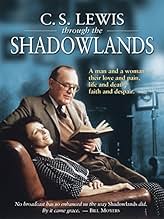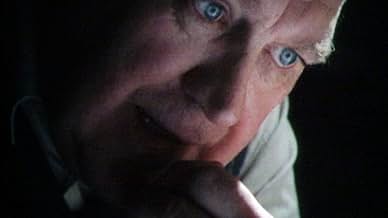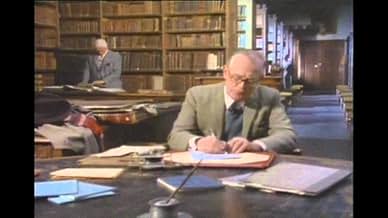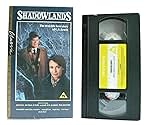Ajouter une intrigue dans votre langueNoted author and scholar finds love, then must endure its loss...Noted author and scholar finds love, then must endure its loss...Noted author and scholar finds love, then must endure its loss...
- Réalisation
- Scénario
- Casting principal
- Victoire aux 2 BAFTA Awards
- 3 victoires au total
Avis à la une
10fortean2
Easily one of my favourite dramatic TV films, in many ways beautiful yet sad, heart-warming and thought-provoking, this is a superb dramatisation of a few years in the life of C.S. Lewis and his relationship with Joy Davidman. I found it to be incredibly absorbing with excellent and 'realistic' dialogue and situations. It all seemed very 'real', yet there were also 'magical' moments that almost leave you breathless with delight. Ackland and Bloom as the central characters were excellent, as were the supporting cast. It's one of those dramas that I find hard to criticise, simply because, for me, there is NOTHING to be criticised, it just works so well on so many levels.
Very highly recommended.
Very highly recommended.
Even though the Hopkins and Winger version had a larger budget, the BBC TV version is just as good. Even though we the issue of cancer is dealt with longer in the TV version, Hopkin portrays C.S. Lewis in more of, may I say, an American way. Both films portray C.S. Lewis with a British actor, but here, we actually forget from time to time that this is not C.S. Lewis and actually I an actor portraying him. This version mentions more about the Magician's Nephew and not the Lion, the Witch, and the Wardrobe more like Hopkin's version. Both include the crying moment between Lewis and his step son up in the attic. Both are powerful and very different. Each is enjoyable if you are a fan of C.S. Lewis.
This version did not move me as deeply as the later, Hollywood version starring Anthony Hopkins and Debra Winger. While it was beautifully filmed and superbly acted, the BBC version was more packed with dialog that imparted information which I found fascinating. It gave me a detailed glimpse of the intellectual, theological and moral considerations that motivated C. S. Lewis. It was therefore more interesting and stimulating than the Hollywood version, but not nearly as visually stunning or viscerally affecting. Still, while I did not leave a heaping mound of sodden Kleenex in the theater, I did use one, and at frequent intervals. I enjoyed this film every bit as much as the Hollywood version, and was grateful for the increased understanding I gained.
10jmkray-1
This was a very faithful presentation of Lewis's life in the mid-50's. The dialogue on theology and the banter with his follow colleagues was exceptionally good. Michael White's book, "C.S. Lewis: Creator of Narnia" deals with this time frame in a very parallel way. Joss Ackland's acting was superb in catching the unemotional Lewis. The movie took great pains to be presented in an accurate English setting. The development of a strong bond between "Jack" (his preferred name) Lewis and Douglas Gresham, Joy's son from her previous marriage, was enjoyable to watch. The movie did avoid the distasteful element of "Warnie" Lewis's (Jack's older brother) drinking problem, but it would not have moved the story on, so it is best left out.
When I was searching on YouTube recently, I was surprised to see "Shadowlands" (1986). After all, I've seen the 1993 movie and enjoyed it...and I knew there previously was a play version. But I never knew that there was this made for TV version...and it's well worth seeing.
The story is about C. S. Lewis and his relationship with American authoress, Joy Davidman. It follows from their corresponding by mail to meeting to marrying and, sadly, her premature death from bone cancer.
Unlike the later and much more famous film, this version sticks closer to the real story. For example, the 1993 film omits a son...whereas Joy actually had two sons. Also, the 1993 version de-emphasized C. S. Lewis' Christian faith and focuses mostly on his fame from having written "The Lion, The Witch and The Wardrobe" and not his more overtly Christian works of fiction and non-fiction.
Overall, I really liked this version. Joss Acklund looks more like Lewis and the film is well worth seeing...and a bit depressing because real life can often be depressing and this portion of his and Joy's life is pretty sad with her untimely passing.
The story is about C. S. Lewis and his relationship with American authoress, Joy Davidman. It follows from their corresponding by mail to meeting to marrying and, sadly, her premature death from bone cancer.
Unlike the later and much more famous film, this version sticks closer to the real story. For example, the 1993 film omits a son...whereas Joy actually had two sons. Also, the 1993 version de-emphasized C. S. Lewis' Christian faith and focuses mostly on his fame from having written "The Lion, The Witch and The Wardrobe" and not his more overtly Christian works of fiction and non-fiction.
Overall, I really liked this version. Joss Acklund looks more like Lewis and the film is well worth seeing...and a bit depressing because real life can often be depressing and this portion of his and Joy's life is pretty sad with her untimely passing.
Le saviez-vous
- AnecdotesJoss Ackland and Claire Bloom also both appear in Vie de star (1987), Mad Dogs and Englishmen (1995), Easter Tales (2000), and notably provide voices in the animated film La Princesse et la Forêt magique (1991), based on the novel by George MacDonald. C.S. Lewis was greatly influenced by MacDonald's fantasy writings and spiritual insights.
- Citations
[first lines]
C.S. Lewis: Why am I so afraid? I never knew that love could hurt so much. Yet I love you, and all I want is to love you. Beyond every door, I hear your voice saying to me, 'This is only the land of shadows. Real life hasn't begun yet.'
- Versions alternatives92-minute television version and 73-minute "abridged" version are available on DVD. The abridged version includes on-screen titles such as "January 1950" and "Two Years Later" at various points in the film. The time difference is made of cuts at the beginning of the film. 92-minute version opens with Jack at the college with a voice-over and the camera passing through a wardrobe. Another long section of cuts start when Jack is walking and reading Joy's letter, the letter is longer and includes a poem. Jack then goes into a classroom and lectures, and later returns home for tea with Warnie. After Joy and Jack's first meeting, scenes of them walking and talking around Oxford is longer. She arrives at his house with her boys, and they play chess with Warnie. Other cut scenes include Jack at a pub with his friends, and finding Douglas reading in the attic for the first time. Jack also tells Joy about when his mother died. And Joy goes to the college for a party and meets Jack's colleagues. The Christmas they spend together also includes a scene of a toast before they leave. Another section of cuts show Jack's life at the college (montage partly included in the opening credits of the abridged version), more scenes of him speaking to students, and talking to Christopher. In a final cut scene, the gardener asks Jack to come outside and he is surprised to find Joy has returned to England. Joy moves into her new house at the 36 minute mark in the full version and at the 17 minute mark of the abridged version, no cuts noted after that.
- ConnexionsRemade as Les ombres du coeur (1993)
- Bandes originalesAbide With Me
(uncredited)
Lyrics by Henry F. Lyte
Music by William H. Monk
Performed by Norman Rutherford
Meilleurs choix
Connectez-vous pour évaluer et suivre la liste de favoris afin de recevoir des recommandations personnalisées
Détails
Contribuer à cette page
Suggérer une modification ou ajouter du contenu manquant





















